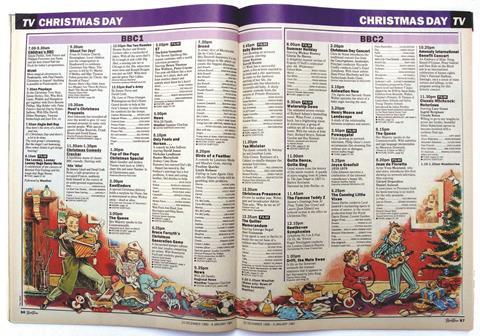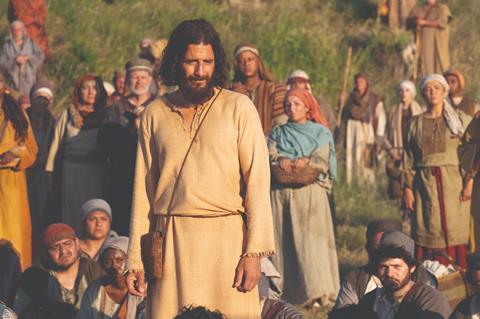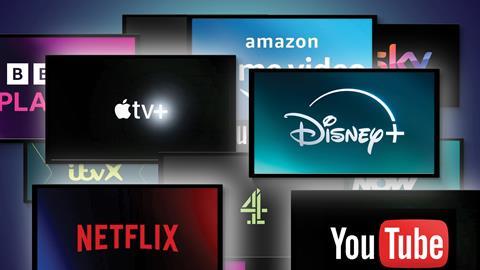Netflix, Amazon and other streaming giants have granted us access to entire libraries full of dramas and documentaries, but can any of us really keep up?
Pitch for a movie; I’m calling it Time Potatoes. Here’s the high concept: two TV-loving couch potatoes from differing eras switch places and try to make sense of each other’s realities.
There’s couch potato one – let’s call him Brian – stuck to his sofa in 1989, where he eagerly awaits the latest episode of Quantum Leap to hit BBC2, and feels excited about watching a late-night rerun of The Golden Girls. Then there’s couch potato two – a modern-day TV streamer named Zach, who spends most of his waking hours keeping up with the latest, most entertaining content on every imaginable platform. He’s got a stacked watchlist across five different streaming services: a non-stop diet of shows and movies from around the world.
Thanks to a little bit of time-travelling movie magic, each is suddenly zapped into the other’s reality. His options suddenly infinitesimally limited, Zach tries to decipher a heavily thumbed and circled copy of the Radio Times. Meanwhile, Brian is confounded and overwhelmed by the request for his Netflix password on an impossibly small portable screen. Nothing makes sense to either of them, and much hilarity ensues.
The streaming revolution happened at fibre-optic speed
Let’s be honest: no one is really going to want to see that movie. But the idea does at least illustrate the extraordinary changes in the way we consume our content over the past 35 years. Almost nothing about how we watched TV in 1989 is true of today. Yet while we might marvel at the democratisation of our viewing options, there’s a problem: with more content than ever before on offer, the danger is we’ll have no time to do anything else.

Climbing the peak
The modern TV revolution – which gave rise to the viewing habits we now take for granted – could not have happened without another, much larger cultural shift: the digital revolution.
The cable and satellite boom of the late 80s, 90s and early 00s created a much more competitive television industry, especially in the USA. This initial shift seemed to provoke positive change, heralding the so-called ‘Second Golden Age of Television’ (the first was in the 1950s). Higher budgets, driven and funded by the contest for lucrative advertising revenue, resulted in a wave of classic TV dramas – 24, The Sopranos, The West Wing and more. Yet once streaming technology evolved, the game changed rapidly again. As movie rental stores such as Blockbuster disappeared from the high street overnight, a wave of new services emerged that were powered by previously unimaginable technology.
You might recall your reaction when the concept of a streaming library was first mentioned to you. It seemed incredible that we might be able to access so much, so quickly. We are now able to scroll through thousands of TV shows, and hundreds of thousands of episodes, and dive in wherever we want within seconds. The world was quickly enthralled, and so just as those movie rental giants and physical media stores went bust, the new players – led by Netflix and Amazon – began to grow in every direction. Customers rushed to sign up; new content was commissioned in a frenzy; the technology leapt on at a pace. The arrival of the Second Golden Age of Television was two decades in the making; in comparison, the streaming revolution happened at fibre-optic speed.

But with proliferation comes a problem. There’s just too much TV to watch; it literally isn’t possible for a person to keep up with every new show, even if they wanted to. This has created winners and losers within the TV industry itself, which is now having to take a more cutthroat turn after a season of constant boom. But in the meantime, we viewers are still left with far too much to watch. How should Christians navigate the peak content era?
All TV shows are not created equal
Sermon on the peak
Most of us love watching TV, and enjoy the breadth and diversity of content on offer. So, rather than simply moralising about how Christians should unplug every screen in sight and instead serve the poor and reach our friends with the message of Christ (both excellent ideas), here are five reflections on how you and I might approach the era of proliferation.
1. Content matters. All TV shows are not created equal – some are uplifting, and some less so. Paul gives us some great guidelines for choosing what we watch and what we skip past in Philippians 4:8: “Finally, brothers and sisters, whatever is true, whatever is noble, whatever is right, whatever is pure, whatever is lovely, whatever is admirable – if anything is excellent or praiseworthy – think about such things.” For “think about”, it’s fair to insert “watch on TV”, and while this might feel like an obvious point, the truth is that in a culture where TV shows are so widely celebrated and discussed, it can be easy to lose track of our boundaries. There are some shows you and I probably shouldn’t watch. That being said, it’s also in line with Pauline theology to suggest that some are more able to cope with ‘stronger’ content without it leading us into sin (see Romans 14:2).
2. You can have too much of a good thing. Proliferated content is a challenge to our self-control (Matthew 26:40; Galatians 5:23). One of the dangers of too many great TV shows (or anything else, for that matter) is that we risk developing an addictive behaviour, non-compatible with running “in such a way as to get the prize” (1 Corinthians 9:24).
3. What’s the opportunity cost? If you read last month’s culture column on Jonathan Haidt’s book The Anxious Generation (Allen Lane), you may have noticed my discussion of opportunity costs: the question of what we miss out on when we spend a significant portion of our time on any one thing. For the Christian, there’s a clear list of distinctive pursuits towards which we’re either commanded or strongly encouraged: time with God; building up the Church; evangelism and discipleship and so on. A genuine challenge can be levelled at any of us in terms of how we use our time. “Tell me what you value, and I might believe you,” Peter Drucker, the famous business guru once said, “but show me your calendar and your bank statement, and I’ll show you what you really value.” Drucker’s point might be extended to our Netflix viewing history.
4. Variety is the spice of television. TV is, of course, a neutral medium. There are lots of fantastic shows that widen our experience of life from the comfort of our armchairs. Wildlife programmes may provoke us to worship God for his beauty in creation; travel documentaries can grant us a globetrotter’s perspective; engaging emotional dramas help us to feel deeply; news programmes enable us to better understand and pray for global issues. Educators encourage students to read widely across a range of authors and genres; the same could be suggested of television viewing. A broad and varied diet enables us to develop empathy, knowledge and understanding; a lazy diet of repetitive, formulaic shows does not.
5. Christ-centred media diets are available. One of the major benefits of the democratisation of television is that niche-interest networking and programming have been allowed to develop and thrive. The crowdfunded gospel-based drama, The Chosen, that has found a global audience and even forced its way onto Netflix. Its success is an indication that great creatives and hungry audiences exist on both sides of the screen, ready to make and enjoy Christ-centred content. Already, it’s possible for viewers and listeners to enjoy an entirely Christian-flavoured media diet – although some debate how healthy that really is.
With more content on offer than ever before, the danger is we’ll have no time to do anything else
What happens next in the fast-moving world of peak content is anyone’s guess. For the first time, subscriber services are battling declining numbers. Rising prices and the inclusion of paid advertising are two signs that unfettered access to cheap, gigantic content libraries may soon be a thing of the past. Yet however they evolve, it’s important that we don’t simply join in with a culture of overconsumption without question. Television is not without value, but as Solomon wrote: “There is a time for everything” (Ecclesiastes 3:1), and the erasure of TV timings can cause us to lose sight of the fact.
I love TV. But it’s good to be reminded that cultural revolutions can overtake and reprogramme us before we realise it. A good spiritual discipline for all of us is to take an inventory of our media consumption and ask: is this helping me to stay close to Jesus? And as you do so, look out for my new movie Time Potatoes, coming to Netflix this autumn…
Don’t bother!
Five over-hyped, long-running TV shows you can avoid, and save hours in the process!
1. Game of Thrones

Eight seasons, Now TV
There are so many good reasons to not watch Game of Thrones – such as the violence, sex and mind-bleaching storylines. But perhaps the most compelling reason of all is that they completely messed up the ending. Why watch something that is only going to disappoint you? Save yourself 73 episodes by giving it a swerve.
2. Lost

Six seasons, Disney+
In a similar vein, this genre-confounding mystery started with a clever premise, and then got too clever for its own good. I wasted far too many Friday evenings trying to make sense of it – don’t make the same mistake.
3. Grey’s Anatomy

21 seasons, Disney+
It just never ends. See also Criminal Minds, Law and Order, Silent Witness and a whole bunch of police and medical procedural dramas that are – in essence – the same every week. Just watch one, and then read a book.
4. Most of the Marvel TV shows

Various, Disney+
There have been some highs, such as WandaVision, but as a self-confessed Marvel fan, let me be honest: The Falcon and the Winter Soldier is sleep-inducing; Secret Invasion is one episode stretched out to six; Hawkeye is unnecessary and Moon Knight is weird (not in a good way).
5. Friends

Ten seasons, Netflix
I know, I know. But hear me out. You’ve seen it all, multiple times. Now, you don’t even find it funny anymore; you just enjoy allowing those 236 episodes to trickle along the worn-smooth neurological pathways in your brain and deliver a microscopic dose of dopamine. Here’s a tip: talk to an actual friend instead.






































No comments yet